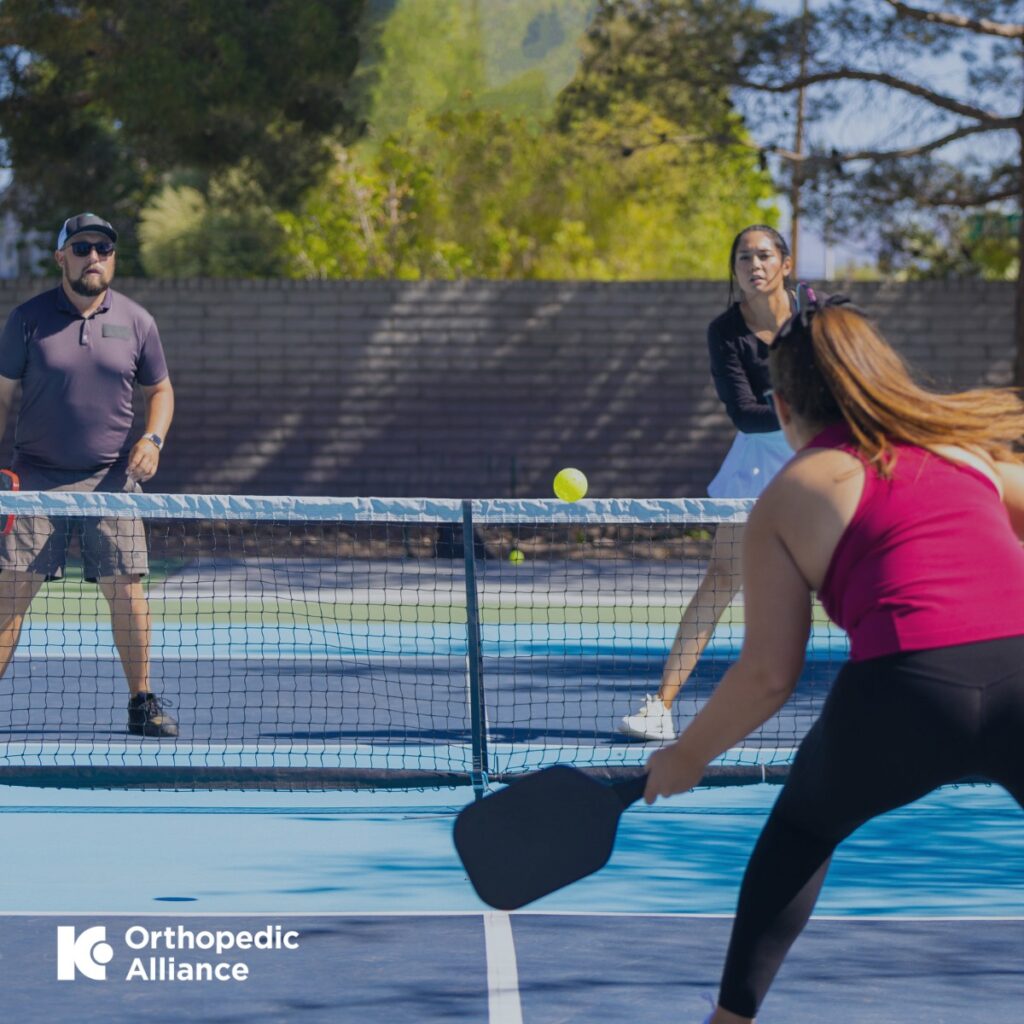
Physiatry, also known as Physical Medicine and Rehabilitation (PM&R), is a field that focuses on enhancing physical function after an illness or injury. However, you may not quite understand what to expect or how to look for physiatry near you, especially for sports-related issues.
As leaders in musculoskeletal treatments, KCOA aims to not only help our patients feel better, but to also educate them on what is happening in their bodies. Specifically, Dr. Khadavi is the one of the only two sports-fellowship trained PM&R physicians in the Kansas City area, along with his KCOA colleague Dr. Brittany Moore.
Keep reading to learn more about physiatry and how we use the practice at KCOA.
What is a physiatrist?
A physiatrist is a doctor who specializes in the diagnosis, treatment, and pain management for conditions that affect the joints, muscles, ligaments, tendons, nerves, and other structures.
The main goal of a PM&R physician or physiatrist is to improve a patient’s functionality to get them back on track with a large focus being the patient’s end goals and lifestyle. Their expertise is conservatively treating orthopedic conditions without surgery, when possible.
Along with completing four years of residency training in Physical Medicine and Rehabilitation, a physiatrist may also be fellowship trained and certified in other subspecialty fields such as:
- Brain Injury Medicine
- Spinal Cord Injury Medicine
- Pain Medicine
- Pediatric Rehabilitation Medicine
- Sports Medicine
- And more
A physiatrist who focuses on sports-related injuries diagnoses and treats a variety of conditions that affect athletes of all ages and expertise.
Keep in mind that these physicians aren’t exclusive to athletes only. If you live a fairly active lifestyle, you could still benefit from the help of a Sports Medicine PM&R physician. Common conditions treated include, but aren’t limited to:
- Ligament tears
- Tendon tears
- Spinal injuries
- Concussion-related brain injuries
- Bone fractures
- Knee injuries
- Rotator cuff injuries
- ACL tears and strains
- Arthritis
Is physiatry the same as physical therapy?
Physiatry and physical therapy are completely different; however, they work together closely.
Although both treat similar conditions, a physiatrist is a physician who has graduated from medical school and has at least four years of residency training. On the other hand, physical therapists undergo a three-year intensive graduate training on exercise-based and manual treatments for musculoskeletal pathologies.
Your physiatrist usually won’t be the one to guide you through an exercise or physical therapy program. For that, he or she will refer you to a trusted physical therapist. Instead, your physiatrist will focus on the diagnosis and prescribing a comprehensive therapies and treatment plan. If you go through physical therapy, you will continue to visit your PM&R physician to ensure that your overall treatment plan remains optimal.
Sports medicine physiatry and common procedures

A patient’s end goals determine which treatment and procedures a PM&R physician will use. For example, if you simply wanted to go back to walking your dog each morning, your treatment probably won’t be as intensive as an NFL player who needs to get back on the field. That’s why whenever you look for physiatry near you in Kansas City, you should always expect to have a conversation about what you want to achieve in the future.
Depending on what works best for you, your physician may include injections, physical therapy, bracing, changes in your activities, pain medication, or even surgery to help reduce your pain and promote better mobility. In many instances, a doctor may combine different treatments, such as pain medications with physical therapy, in order to achieve optimal outcomes.
Ultrasound technology and physiatry
Ultrasound technology is very helpful for diagnostics and guiding procedures. Therefore, it’s very important to find a physician, such as Dr. Khadavi at KCOA, who implements ultrasound for patients.
From the diagnostic side, ultrasound is outstanding for diagnosing soft tissue and some bony conditions, and often has a higher resolution than an MRI. Ultrasound has an advantage over MRIs and CT scans because of its higher resolution and the physician may perform dynamic scans–such as moving the shoulder during imaging–to ensure he or she understands the behavior of the muscles and joints.
A few common diagnosis via musculoskeletal ultrasounds include:
- Rotator Cuff Tears
- Hip Bursitis
- Patellar Tendonitis
- Ganglion Cysts
- Ligament Tears in the Foot and Ankle
- Tears in the Knee
- Tennis Elbow
- Impingement
- & more
On the guidance side, ultrasound greatly improves the accuracy of injections. For example, glenohumeral injections in the shoulder miss their mark about 50% of the time without ultrasound imaging. But musculoskeletal ultrasound technology makes almost all injections approximately 99% accurate. For you as an orthopedic patient, that means whenever you’re getting an injection—whether it be cortisone, PRP, or stem cell—you will have peace of mind knowing the injection hits the target on the first time around.
KCOA is leading the way among orthopedic groups in Kansas City with a forward thinking modality for our image guidance, injections, and diagnostics. Four out of seven of our physicians routinely use ultrasound, all of whom were either trained by Dr. Khadavi or took a course on their own. With the help of this technology, our doctors are more accurate and provide better outcomes for our patients.
Regenerative medicine and physiatry
A physician who stays on top of the research curve understands that regenerative medicine and orthobiologics can treat many musculoskeletal conditions without the need for surgery. Regenerative medicine involves treatments that use live cells, platelets, and other biologically active molecules to heal an injury.
For stem cell treatments, studies have shown that the most effective treatments come from your body. Even still, a lot of stem cell treatments you may find won’t be pulled from your body. See our Guide to Orthobiologics & Regenerative Medicine for more information.
With regenerative medicine, our doctors can fix many injuries without surgery. For example, a cutting-edge stem cell treatment can help treat a rotator cuff injury that would have normally required a surgical fix, which Dr. Khadavi has had great success with. As a result, orthobiologics allows doctors to treat patients in a way that entails less pain, less rehabilitation, and less expense. Plus, regenerative treatments are nearly risk free. The risk for a major complication is about 7 in 1,000,000, while the same risk for from surgery is between 1 to 2%.
For orthopedics specifically, regenerative treatments can heal and/or improve:
- Tendinosis / Tendinopathy
- Tendinitis
- Small Tendon Tears
- Ligament Sprains & Tears
- Loose Ligaments
- Muscle Tears
- Fractured Bones
- Soft Tissue Sports Injuries
- Mild-to-Moderate Osteoarthritis
- Back Pain Related to Degenerative Discs & Facet Joints
- & More
Benefits of going to a private practice for physiatry near you
All of our physicians at KCOA are strong believers in using our resources and knowledge to help patients avoid astronomical facility fees (which could cost thousands). For you, that means your upfront costs and long-term costs are much lower than if you were to visit a hospital or University practice.
While the largest benefit from treatment at KCOA Orthopedics is cutting-edge treatment from physicians who put patient care before all else, there is an enormous “value” benefit that KCOA offers as a private practice. Many of the fees and expenses of a hospital are completely bypassed in your workup and treatment at KCOA, and many procedures may be performed at a surgical center rather than a hospital to maintain the highest standard of care while decreasing the costs to you.
In addition, patients are able to build a stronger relationship with our physicians through a private practice model. Since there are less hoops to jump through, there is more time to sit down one-on-one with a doctor and have in-depth conversations about questions, concerns, and long-term goals.
KCOA prides ourselves on building a rapport with each patient, because we understand just how challenging and confusing dealing with pain and injuries can be. We want everyone to feel comfortable throughout the process, knowing that they have all the information they need to feel at ease.
Get to know Dr. Khadavi at Kansas City Orthopedic Alliance

Dr. Khadavi is the only physician in the Kansas City area who is triple board certified in Sports Medicine, Physical Medicine and Rehabilitation, and Musculoskeletal Ultrasound (RMSK). He not only specializes in regenerative medicine, he is also a field leader who teaches best practices to other physicians across the country.
As a result, patients receive treatments that are most likely to work in comparison to cheaper alternatives. With the help of KCOA’s private practice model, Dr. Khadavi ensures each patient receives the most value that doesn’t involve hidden fees or outlandish pricing.
The core of his success lies in proper diagnosis. An appointment with Dr. Khadavi includes the highest quality technology to pinpoint a patient’s underlying musculoskeletal conditions. From there, he can suggest the most quick and effective set of treatments to target your areas of concern.
For a thorough evaluation with Dr. Khadavi, call us at 913.319.7600 or schedule an appointment today.


